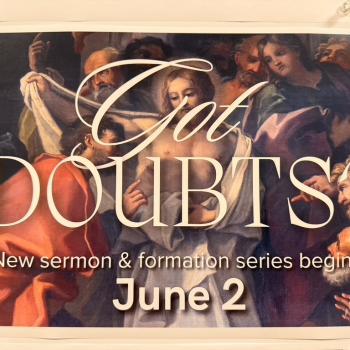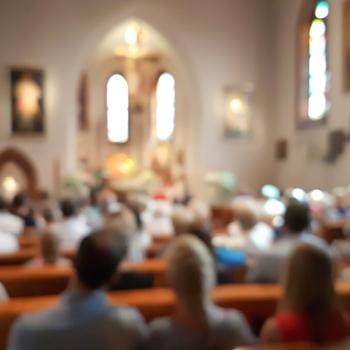 I have a Facebook page, in fact, I have three of them. I have an Instagram account, a Twitter feed, and a Linked In profile. I preach and I teach, but I normally avoid political posts, and in the ones that I do post, I attempt to highlight the complexities that we face as a nation. And I never, ever publicly advocate for a specific candidate or political party.
I have a Facebook page, in fact, I have three of them. I have an Instagram account, a Twitter feed, and a Linked In profile. I preach and I teach, but I normally avoid political posts, and in the ones that I do post, I attempt to highlight the complexities that we face as a nation. And I never, ever publicly advocate for a specific candidate or political party.
I do this for a variety of reasons:
One, although I have been interested in political science and politics since I was a teenager, it is no longer my central passion and concern. As a Christian, a priest, and a theological educator, I have the privilege of devoting my energy to the tasks that I believe are central to human flourishing.
Two, I do not believe that what I believe politically is indisputably right and good. More importantly – I don’t believe that my politics can or should be equated with is “Christian.” Although I make every effort to think deeply and faithfully about the political choices that I face as a citizen, I also believe that equating what I believe with what all right-thinking Christians should believe would be both arrogant and dangerous. Worse, yet, such an equation would, by definition, imply that anyone who disagrees with me is neither right-thinking, nor a Christian.
Three, as a priest of Christ’s holy church, it is my responsibility to minister to all of God’s people. So, promoting my own political views as one with “what all good Christians should believe” betrays that oath. In turn, that equation makes it impossible for me to serve as a priest to those with whom I disagree. The oaths that I took at my ordination forbid that kind of easy and self-centered tribalism. And there are still other reasons:
None, absolutely none of the books in either the Old or the New Testament were written in directly comparable economic, social, or political settings. It is impossible draw the kind of easy comparisons that people at both ends of the political spectrum make between the Bible and the world in which we live. It is not possible to argue that Jesus was a socialist or a capitalist, a Republican or a Democrat, or that the early church was governed by policies that are now seamlessly offer for governing our nation.
The first followers of Jesus lived in a world in which to be a Jew was a seamless experience both in terms of religious and political identity. Jesus embodied and offered a vision of God’s reign that was addressed to that community and embraced those on its margins. Similarly, in a fast-evolving set of circumstances, subsequent generations of Christians proclaimed those values to the world, but they clearly believed that that the reign of God began with the household of God.
Neither Jesus, nor his followers were offering a blueprint for the nations of their day, never mind the nations of the Twenty-first century. To argue that they did is to indulge a fundamentalist approach to biblical interpretation that thrives on the equation that “this (in the Bible) is that (in our own day and time)” and it is an errant approach, whether in service to the fundamentalism of the right or the fundamentalism of the left. Moving from Scripture, never mind the Christian tradition, never mind the truth that is embodied in the Son of God to the politics of our own day is not so easy, and asking the question, “How, then, shall we live?” must – by definition – begin with “the household of God.”
That Christians have come to believe that seizing control of the politics of the nation in the name of their understanding of the reign of God has missed this point. It is why membering, why becoming a body-part of Christ’s body in the world, has become mere affiliation. It is why the church is a shrunken and shrinking expression of what it was in the first few centuries. And, it is also why the church is so badly formed in its own faith.
I do believe that the redemptive work of Christ should shape the way in which we vote and the way in which we live, but I don’t believe that those judgments are easy to make. I don’t believe that “right-thinking Christians” will always agree. I don’t think that simply because other Christians might differ with me, that they are, therefore, mean-spirited or hateful, and that they are “less Christian” or unchristian because they don’t agree with me. How we get from what we believe to responsible citizenship is not an easy calculation, not least of all because our political system was not created to reproduce the reign of God as Christians understand it.
That observation brings me to a final constellation of reasons I am not a political priest.
The vows that I took require me to teach and defend the faith, to preach the Gospel, and to “duly and rightly administer the sacraments of the church.” I deeply believe that those commitments are critical to God’s work in the world. I do not believe that they are the only commitments that are critical to God’s work. I don’t believe that they entitle me to special status among God’s people, and I don’t believe that they can be pursued faithfully and fruitfully apart from the people of God. I also deeply believe that if I am faithful to those efforts that the Holy Spirit will guide God’s people in living their faith and, yes, in faithfully discharging their responsibilities as citizens.
If we as priests of God’s people do not attend to that responsibility, we have nothing to offer. If we use the pulpit to do other things, we neglect our primary responsibility. We are not political partisans. We are not trained to be political partisans. We did not take vows to serve a politician or a political party, and to use Christ’s church, her sacraments, or her pulpit to serve those masters is, at best, to fail to fulfill our vows and, at worst, to fail the Lord we serve.
This does not mean that I do not care about human dignity and human rights, or the policies that may or may not enhance one or the other. Those concerns are embodied in my baptismal vows, which enjoin me to serve “Christ in all persons.” Indeed, that vow makes greater demands on me than a civic appeal to the rights of others.
It does not mean that I am not concerned about structural sin or about its manifestations. There, too, my baptismal vows apply. But the easy equation that we have made between differences of opinion and the embodiment of evil has fed self-righteousness and division, which we have excused by suggesting that we are at a tipping-point socially and politically in which “we” and “we, alone” are right and others are, by definition, “evil.”
There are those who will argue that we are in a moment not unlike the one in which Dietrich Bonhoeffer lived. Analogies to Hitler and the Fascism of Nazi Germany are scarcely credible, and they trivialize the enormity of the evils that Hitler’s regime perpetrated. They also overlook the fact that, in response, Bonhoeffer preached the Gospel, and that it was the failure to preach the Gospel that was at the heart of his criticism of both mainline Protestantism in this country and the church in his own.
If Christians are to speak a word of hope into the caldron that is marked by this measure of acrimony, it must be a word of charity and discernment, of patient listening and learning. If we don’t — if to be a Christian or to be a priest has been reduced to being political, left or right — then we have nothing to offer, and we have lost the thread of redemptive love that has called us out of the world in which we live and to which we are called to serve as witnesses.












